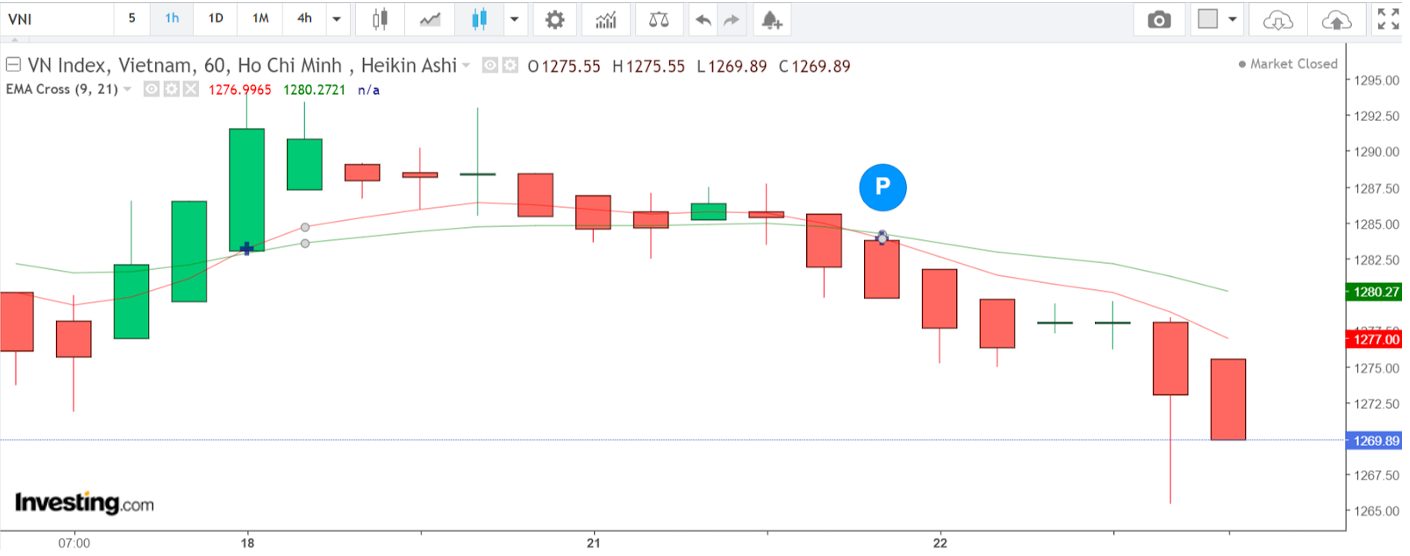CFD Trading In Vietnam



Contract for difference (CFD) trading is gaining traction globally, and Vietnam is no exception.
CFDs offer a flexible way to trade on the price movements of various assets without actually owning them. From stocks and commodities to currencies, CFDs give you a chance to profit (or lose) based on market changes.
In this beginner’s guide, we’ll dive into how CFD trading in Vietnam works, what makes it appealing, and the risks you should keep in mind.
Quick Introduction
- With CFDs, you can trade various markets without owning assets. This could be Vietnamese stocks, the country’s key export commodities like coffee, and other global markets.
- CFDs allow you to trade with leverage, meaning you control a large position with less capital. This can magnify potential returns but also losses, making risk management vital.
- One of the big attractions is the ability to trade both sides of the market. You can make money whether an asset rises or falls. This makes it very appealing during volatile times.
- Unlike traditional stock markets, many CFD markets operate 24/5, so you can jump into trades outside regular hours. This is perfect if you want to react quickly to global events.
Best CFD Brokers In Vietnam
After hands-on tests, we've found these 4 CFD trading platforms are superior for traders in Vietnam:
How Does CFD Trading Work?
CFDs allow you to trade financial markets without the expense of owning the actual assets.
Leverage is a core element of CFD trading. It lets you open larger positions while you only commit a fraction of the total value (or margin) needed to, for example, buy the equivalent amount of shares listed on Vietnamese stock markets.
To show you how this works, let’s use a CFD to trade a popular Vietnamese index: the Ho Chi Minh VSE. Also known as the VNI, it is a capitalization-weighted index that tracks the performance of 303 equities listed on the Ho Chi Minh Stock Exchange (HOSE).
If you’re convinced the index will rise, you’d buy a CFD position in the VNI. If each contract is valued at 1,270, and your brokerage requires a 5% margin, then to take a position on 100 contracts, you’d need a margin of Vietnamese dong (VND) 6,350 (1,270 per contract x 100 contracts x 5%).
If the VNI rises to 1,300, the price increase would yield VND 30 per contract. By closing your position, you would secure a total profit of VND 3,000 (100 contracts x VND 30), excluding broker fees. But, if the index falls to 1,240, you would lose VND 3,000.
This highlights the risks involved with CFD trading; you can control significant size with leverage, but gains and losses are increased.
You need to know how margin and leverage work, as it’s critical to your CFD trading success.If you are new to this style of trading, think about opening a demo trading account. It’s a brilliant introduction to trading, and you get to practice strategies and build confidence with CFDs before you risk dong in the markets.
What Can I Trade?
CFD trading provides opportunities across several financial markets, both in Vietnam and globally:
- Stock CFDs – You could trade individual Vietnamese shares listed on the HOSE using CFDs without the added expense of buying and holding the shares. Alternatively, you could trade stocks in nearby Asian countries like China and Thailand, or further afield like Europe and the US.
- Index CFDs – The Ho Chi Minh VSE is one of Vietnam’s leading share market indices. Traders often opt for index CFDs to capitalize on a stock exchange’s overall market performance rather than trade individual shares. Alternatively, you could consider trading global index CFDs like the Dow Jones or S&P 500. Liquidity is always high on these popular indices; consequently, the trading costs are very competitive.
- Forex CFDs – The Vietnamese dong (VND) can be traded in the foreign exchange market, albeit it sees relatively low volumes. Relevant currency pairs include USD/VND and JPY/VND given the close ties of the respective trading partners. For superior liquidity and more competitive costs, you could consider majors like EUR/USD and USD/JPY.
- Commodity CFDs – Commodities like coffee given Vietnam is one of the planet’s top Robusta bean suppliers, as well as gold and crude oil, can be traded as CFDs, allowing you to speculate on the upward/downward price movements of these valuable global resources.
- Crypto CFDs – Vietnam’s fascination and excitement over digital asset trading mirrors other nations. You can trade cryptocurrency CFDs like Bitcoin and Ethereum for access to the volatile but high-risk world of crypto.
Is CFD Trading Legal In Vietnam?
CFD trading in Vietnam operates in a legal grey area. The country doesn’t have specific laws banning CFDs, but it doesn’t have clear regulatory guidelines governing this type of trading.
Vietnam’s financial authorities, such as the State Securities Commission (SSC), focus more on traditional stock and bond markets. Domestic brokers generally don’t offer CFDs, leaving traders relying on international brokers.
Vietnamese traders usually access CFDs through offshore brokers licensed in other countries with more robust regulatory oversight, such as the UK’s Financial Conduct Authority (FCA).
While this allows Vietnamese investors to trade in global CFD markets, it comes with risks. Not all international brokers are reputable, and since they’re outside the jurisdiction of Vietnamese regulators, recovering funds or seeking legal recourse can be difficult if things go wrong.
Although CFD trading itself is not illegal, participating through unregulated or less reputable brokers could expose you to legal and financial risks.You should be aware that, while not currently a legal issue, the landscape could change as Vietnamese regulators review evolving financial products and markets.
Is CFD Trading Taxed In Vietnam?
Vietnam doesn’t have specific tax laws or regulations directly addressing CFD trading because the country’s financial regulator focuses more on traditional investment vehicles like stocks, bonds, and real estate. However, this doesn’t mean that CFD profits are entirely exempt from taxes.
In Vietnam, personal income is generally subject to taxation, including income from trading activities. Although CFD trading isn’t explicitly mentioned in Vietnamese tax law, profits from such trading could still fall under “other income” or “capital gains” categories. If you earn significant profits from CFD trading, these gains might be taxable under personal income tax laws.
Day traders who frequently deal in CFDs might want to consult a tax professional to understand their obligations and avoid potential issues later.
Many Vietnamese traders use international CFD brokers, who are not required to report earnings to Vietnamese tax authorities. However, just because income isn’t automatically reported doesn’t mean it’s exempt from taxation. Traders are still responsible for self-reporting their trading profits when filing their taxes.
An Example Trade
To show you how CFD trading in Vietnam works in practice, I’m trading one of the leading indices in Vietnam, Ho Chi Minh VSE.
If I’m looking for an example trade in unfamiliar markets, I prefer to focus on indices rather than individual stocks. Why?
- First, the fees for trading a stock on an exotic exchange can be exorbitant, especially if you’re using an international provider based in say Europe.
- Next, a specific stock might have low liquidity; therefore, the chances for poor fills, widening spreads, and sudden bursts of volatility (not identified or predicted by my detailed technical analysis) increase exponentially.
It’s also worth noting that many investment banks trade indices and ETFs specific to certain countries and exchanges rather than buy and sell individual stocks; consequently, liquidity can be high and fees competitive.
Fundamental Analysis
If trading an index CFD, I’ll conduct research similar to trading major currency pairs. I’ll look at my economic calendar for specific publications about the country, such as GDP, government borrowing, unemployment, export/import figures, inflation, etc.
I also scour newswires to gauge the overall economic sentiment and see if government ministers are actively pursuing new markets and opportunities.
Technical Analysis
Although I trust a small number of technical trading indicators, I often trade using just one. I’ll look for the indicator to deliver a signal, and when combined with price action delivered by interpreting candlestick formations, this strategy can prove to be highly effective.
Remember that you’ll have to make a quick decision when day trading an index. You don’t have the luxury of procrastination; you have to be able to process fundamental and technical analyses and make decisions within seconds or minutes.
For this trade, I used a straightforward EMA crossover strategy and Heikin Ashi (HA) price action analysis. My alert to enter short arrived as the EMAs crossed. Previously, the HA candles indicated a ranging market; then, after the formation of the Doji, which indicated indecision, a solid, red, bearish candle formed, delivering my cue to enter.

A series of bearish candles followed, encouraging me to stay short. I remained short despite the two Doji candles indicating that the trend’s momentum might have been exhausted because the EMAs remained wide. The market closed, but I’ve held this trade over.
I entered short at 1,280, and the market close was 1,269. I initially set my stop loss order at 1,288, the most recent high. In doing so, the stop was positioned where my prediction would be proven wrong, and the trade would have failed.
However, because the trade has moved in my favour, I’ve moved the stop to my market entry point, 1,280. Effectively, I’m in a free trade now; I can’t lose.
I used a CFD for this order, and despite it being an ‘exotic’ index, my European broker only required a 5% margin.I‘ve used 1:5 leverage, and, as is my habit, I only risked 1% of my account size on this trade.
Bottom Line
CFD trading in Vietnam offers exciting opportunities, but it comes with its own set of challenges.
While legal, the lack of a formal regulatory framework means traders must rely on international brokers and tread carefully to ensure they use reputable platforms.
The leverage, market access, and flexibility of CFDs are attractive to many, but they also come with high risks, including significant potential losses.
Taxation on CFD profits in Vietnam is another grey area, so it’s wise to stay informed and consult a tax expert to ensure compliance. As Vietnam’s financial regulations evolve, traders should be prepared for potential changes affecting their trading activity.
To get started, use DayTrading.com’s selection of the best CFD day trading platforms.
Recommended Reading
Article Sources
- Ho Chi Minh VSE
- HOSE
- Vietnamese dong - Trading Economics
- State Securities Commission (SSC)
- Heikin Ashi - TradingView
The writing and editorial team at DayTrading.com use credible sources to support their work. These include government agencies, white papers, research institutes, and engagement with industry professionals. Content is written free from bias and is fact-checked where appropriate. Learn more about why you can trust DayTrading.com



